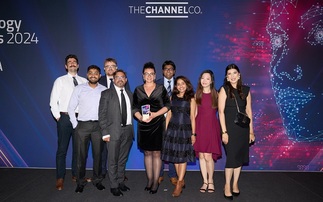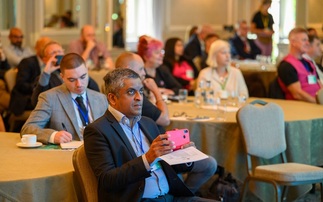'At the core I'm a nurse but I could see processes struggling to keep up with the times', says CNIO Dione Rogers
Dione Rogers, chief nursing informatics officer (CNIO) at Kettering General Hospital (KGH) NHS Foundation Trust seems, at first glance, to be an unusual inclusion in the judging panel at the Women in Technology Excellence Awards.
However, she is a former winner of the Digital Leader of the Year award. In 2020 judges recognised her outstanding contribution to the wellbeing of patients and employees of KGH by means of her highly successful stewardship of digital initiatives within the KGH Trust.
Rogers has been a nursing professional for 26 years, working in acute care and also in rehabilitation, but by 2019 could see that the digital access to services in common use in other industries had the potential to deliver huge benefits to the NHS and its patients. She was so convinced of the power of digital transformation that she turned down a promotion in favour of her present role as CNIO.
"At the core I'm a nurse but I could see processes struggling to keep up with the times. I have a banking app. I basically bought my house on my phone. But I can't book an appointment, I can't see my letters. I just felt that things needed to be more efficient, and I wanted to help nurses in particular, to be able to do their jobs well."
Rogers' credibility as a senior nurse was important from the outset because it helped her to sell the idea of modernisation to other health care professionals who were less convinced about the ability of the NHS to successfully implement digital change. The NHS has a less than stellar track record with technology implementation and a certain degree of cynicism prevailed.
"People would say that we've talked about it for years but it's never going to happen."
Whilst Rogers had some sympathy with those who weren't convinced that change would lead to positive outcomes, she didn't flinch from the challenge of changing mindsets.
Once you start do not stop!
"The only way I felt we could change that mindset was to throw everything at this. I spoke to someone from another trust, and they mentioned the importance of momentum. Once you start do not stop! Keep problem-solving. Being in operational management, problem-solving is my thing."
A plan was quickly created to generate this momentum with a relatively quick win - and this came in the form of a module called Vitals. Rogers explains the principle:
"When you go into hospital, you have your vitals - blood pressure and temperature - recorded at regular intervals. Normally that gets handwritten on a chart. Now all of that goes into an iPad, and that calculates a score called an early warning score. That score then determines whether the patient is stable or is at risk of deterioration. If a patient score goes up, we can identify the need for an intervention."
Vitals launched in October 2019 and within six weeks was rolled out to all adult wards in KGH. By any measure this is a quick roll out. According to Rogers, that was a crucial part of the plan.
"We were very quick because I needed people to really get that it was happening. The key turning point was the day that the charging cabinets got delivered and we put devices on the wall. The wards were fantastic, they really embraced it. That created the momentum - that real energy and drive - and people started to get really interested."
Having sparked this enthusiasm for a wider scope of digitisation, Rogers moved quickly to rolling out Connect - a secure messaging service for patient care. This removed the need for bits of paper being handed over by clinical teams at shift changeovers.
Nurses carrying around scraps of paper didn't fit with the direction that nursing needs to be moving in
"From one shift to another information was being lost. Scraps of paper are not very scientific, they're not following any sort of algorithm, they're not recorded or auditable. I was motivated by patient safety but I'm also passionate about the nursing profession becoming more professional. Nurses carrying around scraps of paper in their pockets didn't fit with the direction that nursing needs to be moving in."
Connect also removed the need for healthcare professionals to resort to other well-known mobile messaging services which had caused issues around data confidentiality.
Rogers believes that the fact that she hadn't been extensively schooled in traditional project management methodology was one of the main reasons that these digital projects have been so successful. When her chief executive asked her how she planned to identify whether Electronic Patient Record (EPR) had been successful, she replied that her key metric was the day when clinicians no longer needed to bring a pen to work.
"I coined a phrase - paper out of pockets."
The phrase captured the imagination of the doctors who were first in line to receive access to Connect - which they did in December 2019. In early March 2020 it was introduced to nurses. The timing of the rollout, coinciding as it did with the beginning of the first wave of Covid-19 could have been a disaster.
However, Rogers wasn't easily thrown off course. Rather than pause the next phase of Connect roll out, the decision was made to keep up momentum. Over the first lockdown use of Connect increased by 400 per cent because it allowed disseminated working. Clinicians working in one part of the hospital could communicate safely and securely with specialists elsewhere. Pictures could be sent, and referrals made without having to be in the same room as the patient. Senior doctors now tell Rogers that they couldn't live without Connect.
All speciality referrals and referrals from Accident and Emergency are now conducted on Connect and the benefits in the form of improved patient flow in, through and out of the hospital have been tangible and impressive.
Rogers believes that the agile approach that the project team took to Connect was a hugely important part of its success. Instead of rolling out the whole application with full functionality to one small pilot group of users and then scaling up, the project team used a minimal viable product approach with a much larger group of users.
"It's why we just did handover and messaging first off rather than the whole application. We wanted that momentum, and we wanted a critical mass of people using the app. We estimated that we needed about 1,200 users to make the rest of the functions really work."
Rogers provides some examples of other areas where Connect is making a difference - in paediatrics, critical care and Acute Illness Response teams. By September, the Vitals and Connect applications were integrated and now included Pathology results - which included Covid-19 test results. The outcome has been information where it is needed - quite literally in clinicians' hands. The days of continually having to return to desk stations or wander even further afield to find relevant patient data are now history - in no small part thanks to Rogers.
With digital momentum now firmly established, the next steps in the ongoing programme of digitisation are fully electronic notes and care plans, a task system specifically designed for out-of-hours care, integrations with other hospitals and the community trust and more teams using virtual clinics for outpatient reviews.
Even on Zoom, Rogers comes over as a passionate advocate for digital nursing and expresses a particular interest in digital inclusion and literacy. She is eager to educate and support the workforce and community and equally keen to avoid accidentally disadvantaging those who aren't confident in their skills.
The Digital Ambassador Programme which Rogers started with a colleague a year ago works to address these issues. Rogers recently led on the ‘I love Digital Week' at the Trust, which aimed to promote, educate and connect staff together. NHS Digital is keen to promote this concept at a national level. With her impressive track record, they would be well advised to make sure Rogers is involved.
The Women in Technology Excellence Awards are open for nominations of outstanding women from around the world across categories including Digital Leader, Role Model and Transformation Leader of the Year. The Women in Technology Festival Global 2021 takes place in November.




















